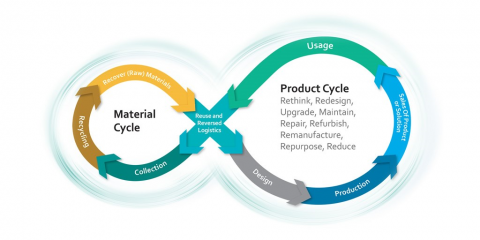Orgalim welcomes the Council conclusions on circular economy
17 December 2020

Earlier this year, Orgalim welcomed the new Circular Economy Action Plan (CEAP), which will play a crucial role in achieving the European Green Deal’s overarching aim of making Europe climate neutral by 2050. Today we welcome the newly adopted Council conclusions, “Making the recovery circular and green”, which give direction to the Commission for implementing the CEAP actions.
Optimising the circular use of resources throughout the economy makes environmental and economic sense and contributes to renewing EU industrial global leadership. "A more circular economy will not only make the transition to climate neutrality faster and more cost effective, it will also help to optimise the use of energy and resources that are such a massive cost to industry," said Orgalim Director General, Malte Lohan. "If Europe gets this right, we are confident we can create opportunities for industrial leadership that will also accelerate our global competitiveness."
Today’s conclusions underline that a well-functioning single market is fundamental, both for the success of the green and digital transitions overall and to support the establishment of an internal market for secondary raw materials. Europe’s technology industries strongly agree. They also correctly recognise that a circular economy creates potential for new business models which could optimise the efficiency and sustainability of products and services along the entire value chain. We welcome the emphasis on digitalisation as key for building a successful circular economy and also support mandatory green public procurement, as a powerful tool to boost the demand for sustainable products.
A more circular economy will not only make the transition to climate neutrality faster and more cost effective, it will also help to optimise the use of energy and resources that are such a massive cost to industry.
To help ensure that the CEAP achieves its aims, we would draw particular attention to the technology industries’ position and recommendations on widening the scope of the Ecodesign Directive and on digital product passports, which can be found on page 4 and pages 9-10 respectively of our detailed Position Paper on the new CEAP. We also note the use of the term ‘substances of concern’ in several places of the Council conclusions. Europe’s technology industries are fully committed to reducing the content of hazardous substances in their products to support a more circular economy. However, there is no definition of “substances of concern” and before addressing such substances, we strongly recommend to first address and handle all Substances of Very High Concern, as there is still a lot to do in this area.
Representing Europe’s technology industries providing innovative solutions which can unlock a greener, healthier and more prosperous future for the EU and its citizens, Orgalim looks forward to working with European institutions and all stakeholders on the next steps t0wards implementing the CEAP actions and building a thriving circular economy.
For more information, please see our detailed Position Paper on the new Circular Economy Action Plan and the Executive Summary dated 15 October 2020. In case you missed it, we also invite you to review Orgalim’s webinar, “A Circular Economy supporting Europe's Green Deal climate ambition” held on the same day.
To know more about Orgalim’s work on the circular economy, please contact Stéphanie Mittelham, Manager Energy and Environment.

LATEST NEWS
How can we create a dynamic, competitive European high-tech manufacturing base?
Orgalim's key recommendations offer policymake...
